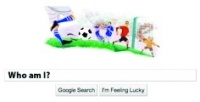There is a good argument that information is becoming way too easy to access. It’s now got to the point that when a random question such as ‘I wonder when cheese was invented?’ pops up in conversation with friends, it no longer reveals who is the biggest know-it-all but instead only shows who has the fastest fingers and best mobile connection speed. (Incidentally, according to the Wikipedia entry found by my Google search, the ‘proposed dates for the origin of cheesemaking range from around 8000 BCE, when sheep were first domesticated, to around 3000 BCE.’)
It is a worrisome thought that the Internet is becoming more of an extension – if not replacement – of our own brains. And a quick Google search shows I’m not the only one who sees this as a problem.

American writer Nicholas Carr posed the question this way in a 2008 cover story for Atlantic magazine: ‘Is Google making us stupid?’
In his new book The Shallows, which comes out this month, he reflects on the subject area even more. According to a summary of the book on Atlantic’s web site Carr compares the Internet’s impact to that of other technological innovations, including the printed book. An excerpt reads, ‘In the choices we have made, consciously or not, about how we use our computers, we have rejected the intellectual tradition of solitary, single-minded concentration, the ethic that the book bestowed on us.’
It’s true the amount of concentrated effort to perform a Google search is pretty much negligible and the amount of time invested in finding an answer to your search query is just about as long as you will remember that probably useless nugget of information.
But imagine if it were even easier to perform a web search by removing the interface to the Internet all together. I have often mused about the possibility of implanting a Google chip in my brain; so that instead of having to fire up my web browser and type my search query, I could just wirelessly download the answer to any question that enters my head. The data would be fed directly to my neural circuits and the results would display visually on my retina. Such a wondrous bit of technology would certainly come in handy during pub quizzes.
The downside would obviously be the difficulty in controlling the results received and if Dr Mark Gasson, from the University of Reading is anyone to believe, the potential for contracting computer viruses.
Oh and one other thing. It’s just freaky.
Google, in its traditional form, does serve a purpose. After all, we can’t be expected to know everything in the world and when information is desperately needed the World Wide Web is an efficient first source. Any journalist will agree.
The problem with becoming so dependent on such a quick and easy source of information, however, is what happens when the Internet goes down.
Here at The Engineer we’re lucky to have a back up. My colleague Stuart Nathan, who we affectionately refer to as ‘Stoogle’, carries around a rather burdensome amount of knowledge in his head.
When I mentioned to him that I was looking up facts about cheese for the Friday Futurescope, I could almost picture the pages of his mental index turning.
‘Are you mentioning tiromancy?’ he said.
‘What?’
I was tempted to google it, but I let Stoogle tell it to me instead.
‘It’s about reading the future through the coagulation of cheese curds.’









Water Sector Talent Exodus Could Cripple The Sector
Maybe if things are essential for the running of a country and we want to pay a fair price we should be running these utilities on a not for profit...